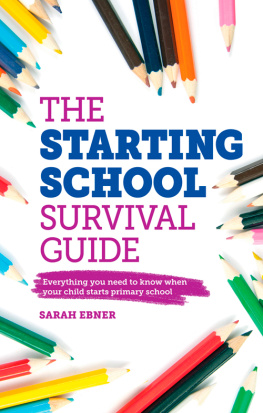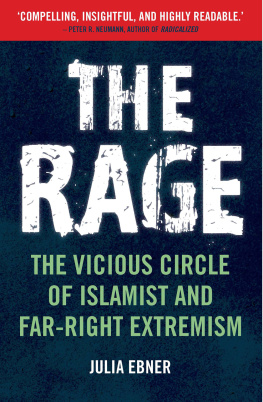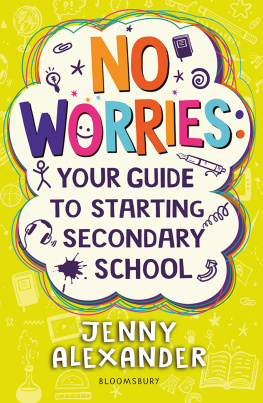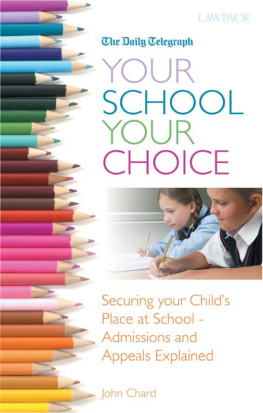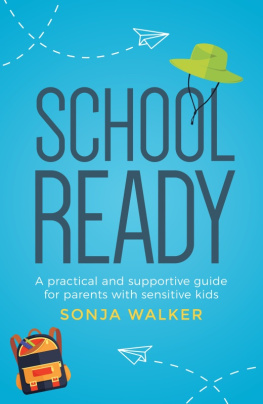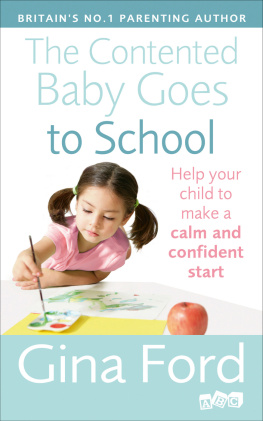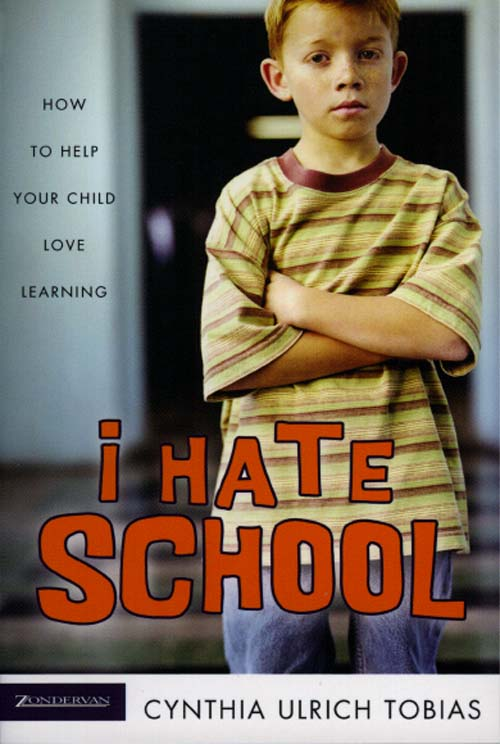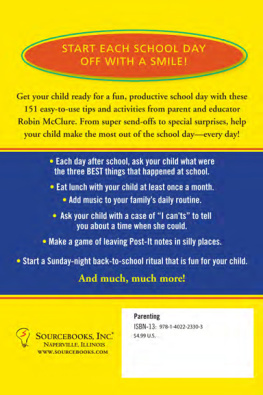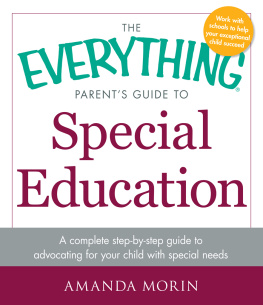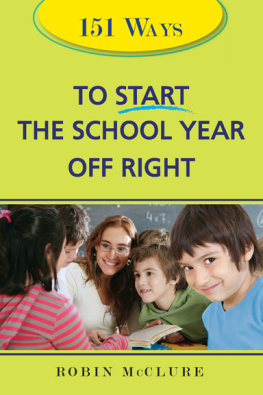Sarah Ebner
THE
STARTING
SCHOOL
SURVIVAL
GUIDE
Everything you need to know when your child starts school

The Starting School Survival Guide
Sarah Ebner
This 1st edition is published in 2011 by White Ladder Press
Crimson Publishing, Westminster House, Kew Road, Richmond, Surrey TW9 2ND
Sarah Ebner 2011
Epub edition 2011ISBN: 978-1-908281-19-7
The author Sarah Ebner has asserted her moral rights to be identified as the author of this work in accordance with the Copyrights, Designs and Patents Act 1988.
British Library cataloguing in Publication data
A catalogue record for this book is available from the British Library
All rights reserved under International and Pan-American Copyright Conventions. By payment of the required fees, you have been granted the non-exclusive, non-transferable right to access and read the text of this ebook on-screen. No part of this text may be reproduced, transmitted, downloaded, decompiled, reverse engineered, or stored in or introduced into any information storage and retrieval system, in any form or by any means whether electronic or mechanical, now known or hereinafter invented, without the express written permission of Crimson Publishing ebooks.
Epub file created by RefineCatch Ltd, Bungay
With love and thanks to my parents, Ann and Henry Ebner
Contents
Huge thanks must go, first of all, to my friend and ex-colleague Samantha Lyster, who came up with the idea for this book in the first place and persuaded me to put a proposal together. Thanks also to everyone at The Times for their help, especially all those who work with me online each day, and who have given me such support with my School Gate blog.
This book wouldnt have happened without Lizzy Kremer and Laura West at David Higham Associates or David Lester and Beth Bishop at Crimson Publishing, so many thanks to them too.
I would also like to express real gratitude to all my friends, those at the (real) school gate, the online one, and beyond. I couldnt have written this book without you.
And finally, I definitely couldnt have done this without the love and support of my family, particularly my parents, my husband, Brian, and the real-life experience of parenting two (gorgeous and wonderful) school-aged children, Jessica and Robbie.
Sarah Ebner, April 2011
Read my blog at www.thetimes.co.uk/schoolgate
And follow me on twitter @schoolgate
Once you become a parent, advice is everywhere. And as you try to work out how to look after the small, helpless baby you somehow managed to create, you grab any advice on offer. But then, after a few years (and many sleepless nights) it stops.
Wheres the book? one friend wailed to me when her son was nearing school age. She didnt know where to look for the best local school, nor how to apply. And when he got a place in Reception she had lots of questions and no one to answer them.
In 2008 I set up an education blog for The Times called School Gate. The idea behind it was to help parents through the maze of education. I soon realised that there were huge numbers of parents out there who wanted this guidance, as well as to talk about what their children were doing at school. School Gate fulfilled a real need.
Thats why I wrote this book. It builds on what Ive learnt from writing School Gate, as well as adding a lot more research and input from teachers, parents and education experts. Having two children of primary-school age also helped me along the way.
Over the last few years, countless people have asked me if there was a book about starting school which I could recommend. There wasnt. There were some which gave basic information, but I felt that parents needed much more than that. So, if you want to know how to find a good school, how to speak to teachers, how to deal with a clingy child, how to make friends (thats you and your child), how to organise playdates, what to do about headlice, and how to understand what on earth your children are learning, read on.
Starting school is a whole new world. This book will help you, not only to survive it, but to enjoy it too.
Authors note: Ive referred to your child as male throughout, and teachers and authority figures as female. This is for consistency and ease of reading.
There are a number of comments from parents in the book. Some of them are taken from my blog and others from interviews done specifically for the book. This helps to explain why some have just a first name (even a pseudonym), while others give more details.
1
Welcome to the next stage of your life! If you have a 3 or 4-year-old child (or, if you are impressively efficient, one even younger than that), you need to start thinking about applying for primary schools. Even though it can seem like a complicated and very, very confusing process, Im here to help you to navigate your way through.
Choosing a primary school is probably one of the biggest decisions youve had to make as a parent so far. Schooling seems so important and grown up. It also seems like something that really will make a difference to your childs life. No one wants to get it wrong.
But life has changed since most of us simply pottered off to the nearest local school. Nowadays, choosing a school can be full of twists and turns.
So, nows the time to think about what kind of education you want for your child and to be honest about what kind of parent you are. Are you looking for small class sizes, lots of individual attention and good sport and music facilities? If so (and you can afford it), then you may want to consider private as well as state schools. However, if your priority is a local school (with local friends) within a short walk from your home, why look further than the school down the road? Providing you can get in, that is
Choice? There isnt really a choice of schools in London. You are just lucky if you get into the local primary which is near your home. We were three roads from our local primary and only got in on the second ballot. We were just lucky it was a great school.
Juliette, mother of three children aged 10, 7 and 4
In other words, problem number one is that the primary school which your child goes to is not totally your choice. You can list the schools you want and cross your fingers, or you can take the private route, but often its the local authority or specific school which decides. However, there are ways to make the whole process more likely to work in your favour.
Whats most important is not to wait for someone to tell you to apply. Admission to primary (and secondary) schools is not automatic. So, if you dont get moving, you might miss the boat completely.
Warning!
This is a very long chapter, covering choosing a school, applying, and appealing if you dont get a place. Its also not the most exciting (or amusing) chapter in the book (hey, applying for a school is a serious business), but needs must, and all this information is important. However, if your child already has a place at the school of your choice, many congratulations! You can skip straight to chapter 2!
Most local authorities (LAs) publish a leaflet or book about applying for schools. These may be advertised in your local doctors surgery or library, or you could try your LAs website. Some LAs have particular staff dedicated to helping with the whole application process and/or offer a telephone helpline. You can also look up state schools in your area on the Governments Schools Finder website, http://schoolsfinder.direct.gov.uk, using your postcode.
Next page
